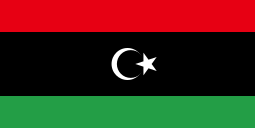2019 Libyan local elections
Local elections were held in 20 municipalities in Libya in March and April 2019.[1][2][3][4] The Libyan Central Commission of Municipal Council Elections aimed for a total of elections in 68 municipalities in 2019.[2]
 |
|---|
| This article is part of a series on the politics and government of Libya |
|
|
|
Legislature
|
|
Judiciary
|
|
|
|
| ||||
|
| ||||
| ||||
| ||||
All 200 seats up for election 101 seats needed for a majority | ||||
|---|---|---|---|---|
| ||||
| ||||
Background
Of the 120 local councils that were created in 2013, the Libyan Central Commission of Municipal Council Elections (CCMCE), headed by Salem Bentahia as of March 2019, is responsible for elections in the 92 municipalities which successfully held elections with legally confirmed results during 2014–2015, and in Zawiya, Bani Walid and Dirj, in which the CCMCE held elections in 2018.[1][5]
March 2019
Local elections were held in nine municipalities in southern and western Libya, including Zuwarah, on Saturday 30 March 2019, with an overall participation rate of 38 percent.[1][2]
April 2019
Elections were held in 11 municipalities in April. On Saturday 20 April, local elections were held in Brak al-Shati, Edri al-Shati, al-Rahibat, Ubari, al-Garda al-Shati, al-Shwairif, and Zaltan. Ghassan Salamé, head of United Nations Support Mission in Libya, complimented Libyans for holding these elections despite the 2019 Western Libya offensive.[2] On Saturday 27 April, municipal elections were held in Sabha.[3] Elections that had been planned for Sabratha and Surman on the same day were postponed by the Libyan National Army.[3] Other towns in which municipal elections were held around these dates included Wadi Otbh, al-Ghuraifa, and Riqdalin.[4]
Sabha appeals
Four appeals against the results of the Sabha election resulted in the election being declared invalid in a judicial ruling. In early November 2019, Judge Ibrahim Mahfouz in the Court of First Instance of Sabha overturned three of the appeals. A single judicial circuit can only consider three appeals on a case in the Libyan judicial system,[6] whose top body is the Supreme Judicial Council of Libya, which remained unified during the Second Libyan Civil War.[7]
May 2019
Voter registration by SMS was reopened by the CCMCE on 14 May for Misrata, Sabratha, al-Khums, Msallata, Jufra, Tarhuna, southern Zawiya, Kufra, Ghat, and eight municipalities in the Nafusa Mountains, including Asbi'a, Al-Haraba, Kikla, Kabaw.[8]
References
- "Libya holds municipal elections in first vote for five years". Middle East Monitor. 31 March 2019. Archived from the original on 31 March 2019. Retrieved 20 April 2019.
- "UN envoy hails Libyans' keenness on holding municipal elections despite war". The Libya Observer. 20 April 2019. Archived from the original on 20 April 2019. Retrieved 20 April 2019.
- Alharathy, Safa (28 April 2019). "Sabha holds municipal council elections". The Libya Observer. Archived from the original on 30 April 2019. Retrieved 29 April 2019.
- "Central Committee for Municipal Elections confirms the election of six new mayors to municipal councils". The Libya Observer. 1 May 2019. Archived from the original on 1 May 2019. Retrieved 1 May 2019.
- "Project Document – Libya – Local Elections" (PDF). United Nations Development Programme. 4 February 2019. Archived (PDF) from the original on 1 May 2019. Retrieved 1 May 2019.
- Alharathy, Safa (6 November 2019). "Court of First Instance of Sabha sets aside ruling to overturn results of local government elections of the city". The Libya Observer. Archived from the original on 8 November 2019. Retrieved 8 November 2019.
- "UNSMIL congratulates the newly elected members of the Supreme Judicial Council in Libya". UNSMIL. 10 July 2019. Archived from the original on 14 October 2019. Retrieved 14 October 2019.
- Alharathy, Safa (15 May 2019). "Voter registration for local government elections to be launched in 17 municipalities". The Libya Observer. Archived from the original on 1 July 2019. Retrieved 15 May 2019.
